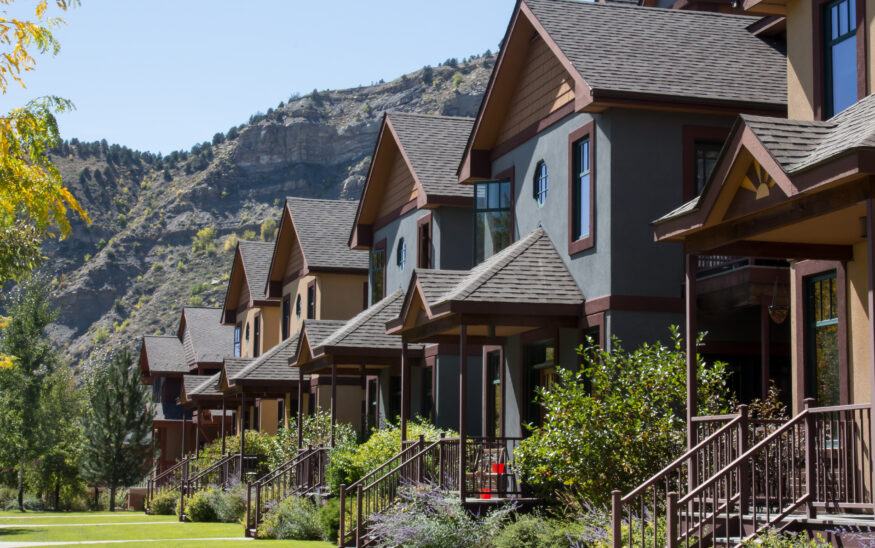6 tips for managing a vacation property during Covid-19
A few easy ways to make sure your Colorado vacation property is welcoming, reassuring and safe
Kristen Herhold //August 12, 2020//


6 tips for managing a vacation property during Covid-19
A few easy ways to make sure your Colorado vacation property is welcoming, reassuring and safe
Kristen Herhold //August 12, 2020//
The coronavirus pandemic has radically impacted the economy—and ruined basically everyone’s summer vacation plans. With most countries still closed to holders of US passports, more and more Americans are rediscovering the getaways and amusements in their own country.
More often than not, these in-country vacations have taken the form of road trips to vacation homes or campsites—after all, a car is a sealed environment, and rentals and campsites don’t require passing through potentially hazardous common areas like hotel lobbies or airport terminals.
In the past couple months, there has been a huge increase in rental home reservations; Airbnb says it actually received more bookings in the early summer than it did over the same period in 2019. According to a survey by travel company Expedia, 85% of Americans anticipate taking at least one road trip this summer.
This trend has especially benefited Colorado. The Centennial State has long attracted tourists and investors alike, but in 2020, the state is currently the top road trip destination in the US, up from 10th last year. And it’s easy to see why—with low rates of coronavirus, amazing national parks, and endless opportunities for social-distancing-friendly activities such as hiking, rafting, or climbing, the state is an ideal destination for a pandemic vacation.
But that doesn’t mean everything is business as usual. Managing a vacation property during a pandemic has its own unique challenges, as hosts need to not only keep their guests comfortable but to keep them safe, too.
Let’s look at a few easy ways to make sure your Colorado vacation property is welcoming, reassuring, and safe.
Space Out Your Reservations
Doctors have noted that the coronavirus can live on surfaces for a day or two. For that reason, many experts recommend that travelers seek out accommodations that have been empty for at least two or three days to give any viral traces time to become non-viable. In fact, Airbnb is now offering a “buffer” feature, which ensures that your rental has been vacant for 72 hours before a guest’s arrival.
Colorado hosts should consider doing something similar. Although it might cut into your bottom line, leaving the rental empty for 72 hours between bookings can go a long way toward reassuring your guests.
Spacing out your reservations will also keep you safer if you don’t have to clean a unit immediately after it was vacated.
Provide Cleaning Supplies
Even if you provide a buffer period between stays, it’s a smart policy to provide your guests with plenty of cleaning supplies, as many travelers make a point of cleaning their surroundings upon arrival.
At minimum, you should provide sanitizing wipes for door handles, counters, and miscellaneous surfaces, hand sanitizer (with at least 60% alcohol, per the CDC’s recommendations) for general use, plenty of soap, and sterile, wrapped masks in case your guests want to go into town.
Consider Relaxing Your Cancellation Policy
One of the big draws of Colorado is its low rate of coronavirus infection, especially when compared to other popular vacation states such as Florida or California. But that can change, and guests know that. Even if guests fall in love with your property after viewing it online, they might worry about losing their deposit if an outbreak prevents them from traveling.
Adopting a more flexible cancellation/refund policy in the event of an uptick in statewide coronavirus cases — or if the guests themselves end up contracting the coronavirus and can’t safely make it to your rental — can make potential guests feel much more confident about making their reservation.
Adopt a No-Contact Check-In Policy
Many hosts were already conducting a no-contact check-in before the pandemic, with lockboxes, keypad locks, or other means, but this has become exponentially more important in the pandemic. Devise a secure way for your guests to acquire keys to the property so they don’t have to come into face-to-face contact with you. The technology for this already exists — many cutting-edge real estate companies were doing no-contact showings even before the pandemic.
And remember— this isn’t just for their protection, it’s for yours, too.
If you can’t avoid a brief physical meeting, make sure you stay six feet away from your guests as much as possible and to wear a face covering (and to ask them to wear a mask, too).
Remind Guests of New Policies
Many vacation rentals have gotten rid of some included items and extra amenities as a result of the pandemic. Experts suggest removing soft or hard-to-clean shared objects from your rental, such as blankets, throw pillows, and some floor coverings. The same goes for complimentary food or drink; the risk of contamination is just too high.
Guests will understand and appreciate these new safety policies, but make sure you remind them, ahead of their arrival, that you no longer provide these amenities, so they can bring their own supplies and furnishings.
Provide Socially Distanced Recommendations
Your guests might be coming from across the country, so it’s possible they won’t know the area. Along with your usual recommendations for dining and recreation, you should try and provide information about local possibilities for social distancing.
There are some great resources out there about Colorado social distancing — and a lot of the information is pretty counterintuitive. For example, a lot of rural areas and small towns may seem like they’d offer high degrees of social distance, but studies have found that their public spaces are actually very dense, with a moderate to high degree of risk for viral transmission.
And if you’re surprised by this information, it’s safe to say that a guest will be, too. Hosting and renting in a pandemic can seem very stressful, but it’s doable — if you just take the time to educate not only your guests but yourself, too.
























